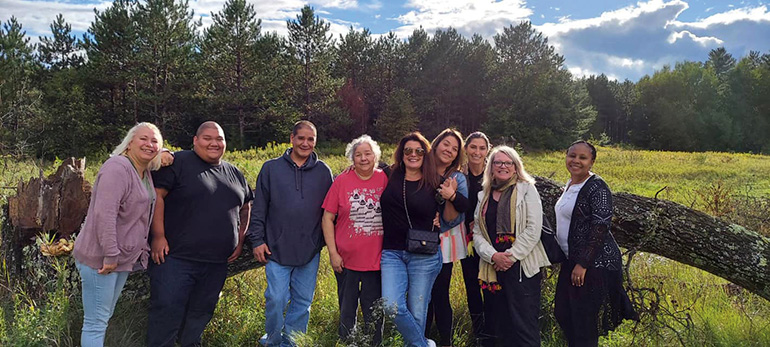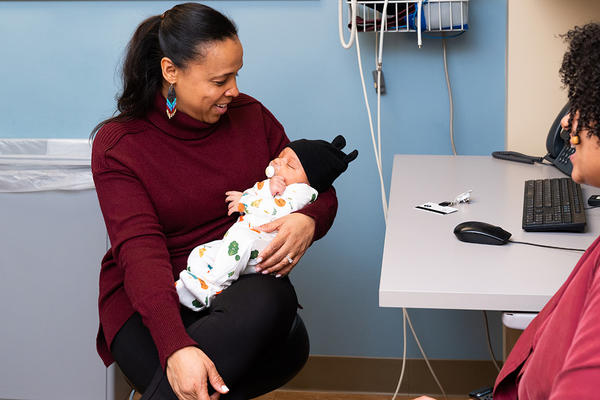New research uncovers how pandemic affected Black, American Indian women experiencing violence
Mkandawire-Valhmu’s research focuses on those with greatest vulnerability, greatest difficulty accessing health care
May 3, 2023
Brett Stursa

Lucy Mkandawire-Valhmu says that because nurses are so trusted as a profession they have an opportunity to significantly address violence in women’s lives.
Prior to the COVID pandemic, Black and American Indian/Alaska Native (AI/AN) women disproportionately experienced intimate partner violence while at the same time experienced some of the greatest difficulty accessing the health care system.
With the pandemic’s social distancing, quarantines and isolation measures, researchers at the University of Minnesota are seeking to understand how the pandemic affected Black and AI women who were experiencing intimate partner violence.
“With the ongoing COVID-19 pandemic, help-seeking for American Indian and Black women has become even more complicated amidst a global concern among advocates that social distancing, quarantine and isolation measures are inadvertently endangering women experiencing intimate partner violence,” says Professor Lucy Mkandawire-Valhmu, PhD, RN, FAAN, who was awarded a National Institute on Minority Health and Health Disparities grant to study the issue. “To our knowledge, while anecdotal evidence shows that the COVID-19 pandemic has complicated women’s experiences of violence with a possible rise in levels of violence resulting in lethal outcomes, no systematic studies exist that track women’s experiences of intimate partner violence during this pandemic.”
Mkandawire-Valhmu is partnering with University of Wisconsin Assistant Professor Jeneile Luebke, PhD, RN, an enrolled member of the Bad River Band of Lake Superior Chippewa Indians, to better understand women’s experience of intimate partner violence during this pandemic.

Mkandawire-Valhmu and Luebke are conducting a community-engaged research study informed by Indigenous and Black feminist thought that includes both qualitative and quantitative methods. Ultimately, they will systematically describe the unique and intersecting structural, economic and interpersonal facilitators and barriers to help-seeking for intimate partner violence among AI and Black women in Wisconsin during the COVID-19 pandemic. Additionally, Mkandawire-Valhmu recently applied for a supplement to also include the experiences of Black and AI women in Minnesota.
They are conducting two waves of surveys with a total of 600 AI and Black women, and individual and focus group interviews with a total of 300 AI and Black women to track women’s experiences, patterns of help-seeking and barriers to help-seeking.
“Our ultimate goal through this study is to create a platform where women’s voices can then inform health practice and health policy while also drawing from a community advisory board constituted of advocates and other key members of AI and Black communities in Wisconsin to provide actionable recommendations for addressing the urgent problem of intimate partner violence in the lives of AI and Black women,” says Mkandawire-Valhmu.
Mkandawire-Valhmu moves Minnesota to broaden research impact
Mkandawire-Valhmu came to the University of Minnesota in 2022 because she wanted to broaden the impact of her research. “Minnesota is a central location for research I hope to conduct in the Dakotas, as well as Minnesota and Wisconsin. I am eager to contribute to the health of women in Minnesota,” says Mkandawire-Valhmu. “The experiences of Black women in Minnesota are a little different than the ones of where I was in Wisconsin, so I hope to understand the differences in women’s experiences and what we can learn across those differences.”
Already, Mkandawire-Valhmu was awarded a University of Minnesota Sustainable Development Goals research grant for Achieving gender equality for women experiencing the deepest vulnerability: A focus on gender based violence in the lives of childbearing refugee women in Dzaleka refugee camp, Malawi.
She is partnering with Associate Professor Sarah Hoffman, PhD, MPH, RN, on a mixed methods study that will provide foundational knowledge about the experiences of gender based violence in the lives of childbearing women living at Dzaleka refugee camp in Malawi.
“I want to continue to work with women who experience the greatest vulnerability,” says Mkandawire-Valhmu.
Greatest vulnerability, greatest difficulty accessing health care
Early on in Mkandawire-Valhmu’s nursing career, when she was earning her first nursing degree living in Malawi in southeast Africa, she observed how women were affected by violence. “I really wanted to understand that and determine as a nurse how I could contribute to addressing their experiences of violence so that they could live healthier lives and they could contribute more meaningfully without the burden of the experiences of violence,” says Mkandawire-Valhmu.
As she earned a PhD – her dissertation focused specifically on violence in the lives of women who work as domestic workers in other people’s homes — and after moving to the United States, she has developed a research portfolio that has deepened the understanding. “I’ve developed an expertise with women who experience the greatest vulnerability and have the greatest difficulty accessing the health care system,” says Mkandawire-Valhmu.
With that in mind, and with her nurse’s sensibility, she strives to make recommendations that are realistic, practical and efficient within the health care system. “For me, it’s important that nurses are more aware,” says Mkandawire-Valhmu. “Nurses are considered a trusted profession, so we have an opportunity to significantly address violence in women’s lives.”


